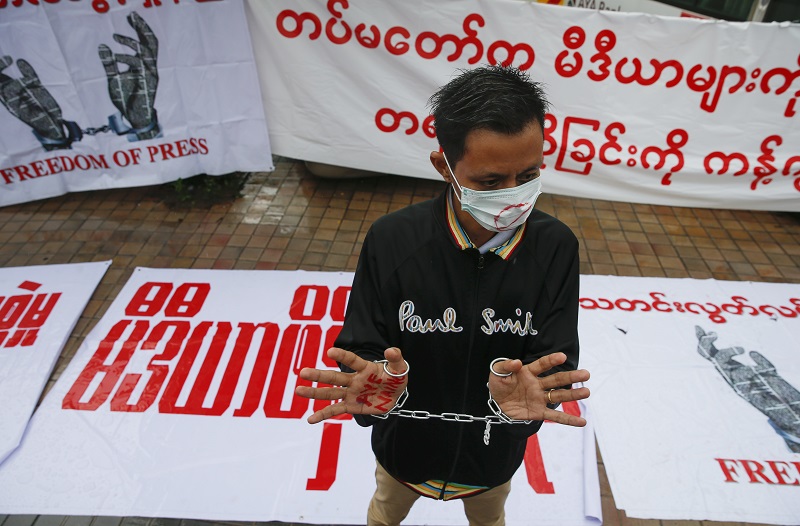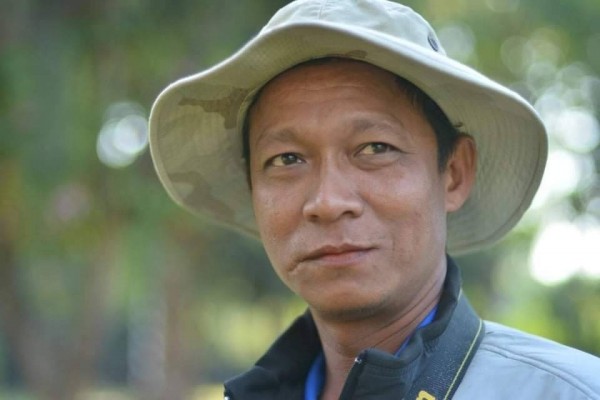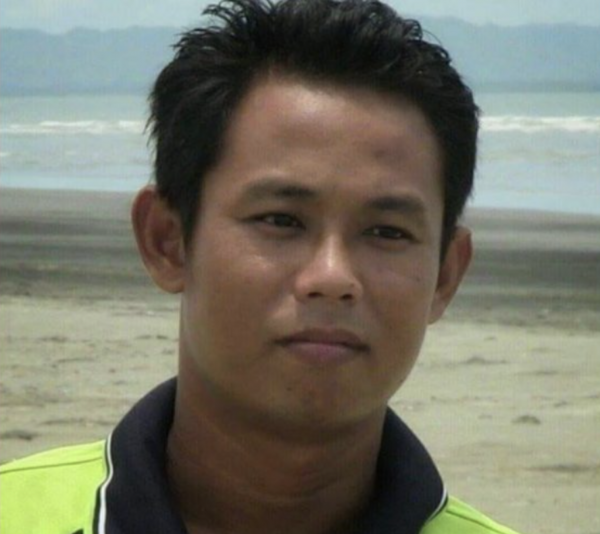Myanmar journalists and international observers welcomed a decision by the country’s military this month to drop charges ranging from defamation to unlawful association against six journalists.
The move marked a positive step, but journalists in the country still have many obstacles to overcome, from enforcement of strict defamation and unlawful association laws, to pushback for covering sensitive issues like ethnic conflict and the military.
Lawi Weng and U Aye Naing from the online news outlet The Irrawaddy, and Ko Pyae Phone Aung from the media organisation Democratic Voice of Burma, had been detained since late June for covering a drug burning ceremony organised by the Ta‘ang National Liberation Army, a local militia engaged in a standoff with government forces.
The Tatmadaw, Myanmar’s military, announced its decision as the three journalists were heard in a court in Hsipaw. In a statement, the military said it was dropping the charges in an effort to “work together for the interest of the citizens and the country”.
In a separate case, charges for defamation were also dropped against Editor-in-Chief U Kyaw Min Swe and columnist Ko Ko Maung of the newspaper The Voice Daily. They were detained in June under Myanmar’s Telecommunications Law for publishing a satirical article on the military. Eleven Media Editor-in-Chief Wai Phyo also faced a defamation charge for an opinion piece on alleged corruption in the government.
The Myanmar Press Council welcomed the army’s decision, saying it was “grateful to the Tatmadaw for showing magnanimity”. Council Member U Myint Kyaw added: “This is how it should have been from the start.”
Laws an Obstacle
Following decades of military rule, Myanmar has strived for democratic reform under a government led by The National League for Democracy (NLD), with Nobel Peace Prize winner Aung San Suu Kyi at its head.
However, her government is currently facing international outcry over military operations against the Muslim Rohingya minority in the country’s Rakhine state. Thousands of Rohingya have died and hundreds of thousands have been driven from the country.
Independent media has flourished in Myanmar since 2012, when official censorship was lifted, but recent arrests and charges against journalists have raised fears that freedom of expression is deteriorating.
Thu Rein Hlaing, editor-in-charge of The Voice Weekly news site, told IPI that Sec. 66(d) of the 2013 Telecommunications Law and the Unlawful Associations Act remain the most problematic legal obstacles, as they are “widely [used] to take action against journalists”.
The former, which has been widely criticised, prohibits the use of a telecommunications network to “extort, defame, disturb or intimidate” and carries possible prison time.
The latter, which dates back to 1908 and carries a potential three-year prison sentence, sanctions any contact with unlawful groups. Rights watchdogs say it effectively allows authorities to arbitrarily detain anyone attempting to cover ethnic conflict in the country.
Little Progress Made
Despite calls from international and Myanmar rights groups to repeal laws that are major barriers to press freedom, the government is accused of doing little to address the issue.
In August, Parliament made minor changes to Sec. 66(d), lowering the maximum penalty from three years in prison to two, allowing judges to release on bail those charged under the law and limiting the ability to press charges to those directly affected by offences.
Individuals still on trial under the law include Swe Win, chief editor of the non-profit news service Myanmar Now. He was detained in late July for allegedly defaming an outspoken ultra-nationalist Buddhist monk in a social media post.
Since April 2016, when Suu Kyi became state counselor, at least 50 cases reportedly have been filed under Sec. 66(d), a notable rise from previous years. According to the Myanmar advocacy group Research Team for Telecommunications Law, some 20 journalists have been arrested and charged under the law.
Several charges have been filed against critics of Suu Kyi. On Feb. 28, a social media user was sentenced to six months in prison for posting text and photos deemed defamatory.
Brang Mai, CEO of Myitkyina News Journal, which focuses on Myanmar’s Kachin state and human rights issues, told IPI that Myanmar journalists regularly censor themselves to avoid criminal charges. He said that while the military was the main abuser of the Unlawful Associations Act, officials in the government often relied on defamation law to target critics.
Tricky Issues Remain
For journalists, covering issues like ethnic conflict and the military are especially tricky. Myanmar’s military still holds considerable power in politics, with control of key ministries and a quarter of the seats in the country’s legislature.
Thu Rein Hlaing told IPI that editors and reporters mainly self-censor when writing about the ruling party and the military. He said journalists “have to be more careful in writing and some media tend to avoid terminologies which the military does not like”.
He added: “Recently, the military is the most aggressive organisation in responding to journalists by suing, or asking for an apology, even if a story has a slight misunderstanding about them. As a result, readers might access limited and incoherent information, though nowadays in Myanmar, during the democratisation period, the quality of information is so crucial.”
Both Thu Rein Hlaing and Brang Mai said that threats and intimidation also are a common problem for journalists and that covering the armed forces, and religious and ethnic conflict, remains dangerous.
Many journalists lament a lack of support from the government. Thu Rein Hlaing said that journalists think “the government is not doing enough”. He noted that while the government has many other issues to tackle, from economic development to armed conflict with ethnic militias, it “should be aware of the meaning of genuine press freedom”.
Brang Mai said that there is a lack of coordination, with questions from journalists often going unanswered by the authorities. Suu Kyi herself rarely takes questions from the media.
In what critics deemed a blow to transparency and media plurality, Suu Kyi’s government recently urged the public to follow news released by the government. Official outlets, including social media accounts, published their own reports on the ongoing conflict in Rakhine state while branding independent media reports “fake news”.



